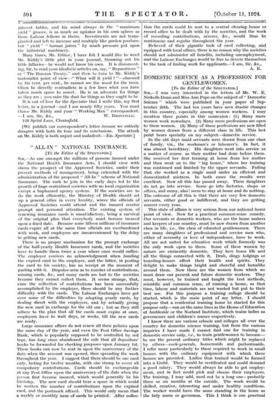" ALL-IN " NATIONAL INSURANCE.
[To the Editcr of the SPECTATOR.]
Sra,—As one amongst the millions of persons insured under the National Health Insurance Acts, I should view with alarm the prospect of the Approved Societies, under their present methods of management, being entrusted with the administration of the proposed " All-In " scheme of National Insurance. The rush to join in the early days led to the growth of huge centralized societies with no local organization except a haphazard agency system. If the societies are to do the work efficiently, the Ministry of Health should set up a general office in every locality, where the officials of Approved Societies could attend and the insured receive prompt and personal attention. The existing system of renewing insurance cards is unsatisfactory, being a survival of the original plan that everybody must become insured upon a fixed date. Because some fifteen millions of insurance cards expire all at the same time officials are overburdened with work, and employers are inconvenienced by the delay in getting new cards.
There is no proper mechanism for the prompt exchange of the half-yearly Health Insurance cards, and the societies have to handle them twice a year where once would suffice. The employer receives no acknowledgment when handing the expired card to the employee, and the latter, in posting the card to his society, has no receipt at the moment of parting with it. Disputes arise as to number of contributions, missing cards, &e., and many cards are lost to the societies because they cannot collect them. It seems strange, that; once the collection of contributions has been successfully accomplished by the employer, there should be any further difficulty with the cards. The Labour Exchanges have got over some of the difficulties by adopting .yearly cards, by dealing direct with the employers, and by actually giving the new card in exchange for the old one ; but as they still adhere to the plan that all the cards must expire at once, employers ha %re to wait days, or weeks, till the new cards are ready.
Large insurance offices do not renew all their policies upon the same day of the year, and even the Post Office Savings Bank, which is popularly supposed to be controlled by red tape, has long since abandoned the rule that all depositors' books be forwarded for checking purposes upon January 1st. These books can now be sent in upon the anniversary of the date when the account was opened, thus spreading the work throughout the year. I suggest that there 'should be one card only, lasting for twelve months, with one stamp to cover all compulsory contributions. Cards should be exchangeable at any Post Office upon the anniversary of the date when the person first became insured, which would generally be his birthday. The new card should bear a space in which could be written the number of contributions upon the expired card, and the postmark affixed. This would only mean that a weekly or nionthly issue of cards be printed.' After collec-
tion the cards could be sent to a central clearing, house or record .office to be dealt with by the societies, and the work of recording contributions, arrears, &c., would thus be continuous and regular throughout the year.
Relieved of their gigantic task of card collecting, and equipped with local offices, there is no reason why the societies should not administer all benefits, including unemployment, and the Labour Exchanges would be free to devote themselves to the task of finding work for applicants.—I am, Sir, &c., A. E.










































 Previous page
Previous page